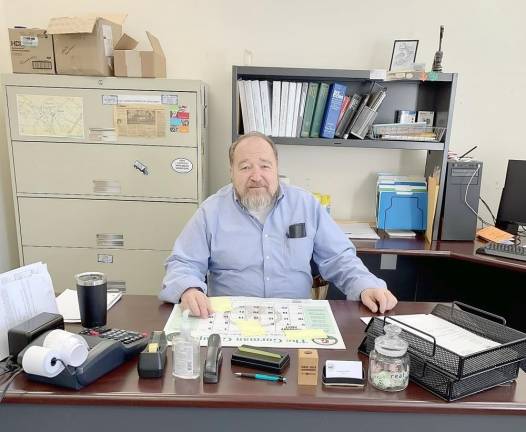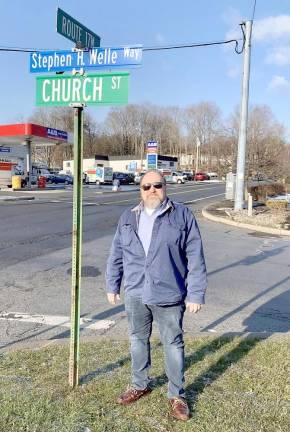The Welle way
Harriman. As Stephen H. Welle prepares to step down after 20 years as Harriman’s mayor, the man known as a ‘no bologna kind of guy’ takes a look back on the community that first drew him and his family here more than 40 years ago.


Looking for a house he could afford in which to raise his family 43 years ago, Stephen H. Welle discovered the “nice quiet safe little village” of Harriman, N.Y.
He has worked ever since to keep it that way.
Friday, Jan. 29, is Welle’s last day as Harriman’s mayor, ending after what the Village Board described as an “extraordinary” 20-year run in the office. That followed service as a volunteer member of the Parks Commission, 12 years on the Zoning Board of Appeals and three years as a Village Trustee.
Welle, who is 68, is moving to the Phoenix, Arizona, area where he will be close to one of his sons and the cost of living is not as high as in New York.
In recognition of his “lasting impact to the success and future” of the village and “as a show of profound respect,” the board recently added an honorary street name to the sign marking the section of roadway between South Main Street and Route 17M where he and his wife Debra raised two sons and a daughter and twin grandsons and still lives.
In addition to “Church Street,” it is now “Stephen H. Welle Way.”
‘He doesn’t make promises he can’t keep’
Welle said in an interview he will miss Harriman, but “it’s time to retire.” He added he enjoyed being mayor with the exception of an “occasional” employee issue. He ascribed his impact to being available to workers and the public and “being involved in every aspect of the village.”
“He’s done an excellent job,” said JoAnn Shuart, whole late husband Edward served as a village trustee and deputy mayor.
“He doesn’t make promises he can’t keep,” she said. “He’s not a politician.”
Welle said he has never aspired to higher office.
“He really loves the village,” said Jim Kelly, another long-time resident. “He knows everybody and is friendly to everybody. He really cares.”
Welle moved to Harriman from Rockland County in 1977. He was a cable splicer for New York Telephone and Verizon, its successor, for 32.7 years before he retired in 2003.
As mayor, he managed a $4.7 million budget and 22 employees.
The village is only one-square mile, split between the towns of Monroe and Woodbury. In 1980, about the time Welle moved there, Harriman had 798 residents. That shot up to 2,288 in 1990 after the construction of several new developments. But the population has stabilized, reaching only 2,542 in 2019, the Census Bureau estimated.
The village has easy access to major highways but it is virtually built out. The tax base is limited with few commercial properties.
A major blow occurred with the closing in 2005 of the Nepera chemical plant that provided 11 percent of the village’s taxes in the last full year of operation. There was talk in the summer of 2019 that the new owners of the now vacant site would erect a gambling parlor with electronic slot machines on the polluted site, but nothing has been heard since.
Water, sewer, sustainable growth and development
Meanwhile, Welle is proud that he has kept taxes within the state-mandated 2 percent cap and says he has been successful in obtaining grants for equipment.
He also enhanced the Mary Harriman Park to expand activities and was instrumental in the development of local access to the Harriman trail.
He has advocated for sustainable growth and development in Harriman and surrounding areas, paying particular attention to water and sewer issues. He has argued that Harriman taxpayers should not be saddled with the cost of expanding the capacity of a county sewage treatment plant, which is located in Harriman but serves several communities, to cope with rapid growth which is expected in the region but in in not Harriman.
Welle has been vocal in arguing, as he and several trustees contended in a letter endorsing the re-election of State Sen. James Sloufis, that “one of the most important factors affecting quality of life issues in the region” is the “unsustainable” growth in the Hasidic community of Palm Tree/Kiryas Joel.
Palm Tree accused the mayor in a tweet of being anti-Semitic.
“It’s not religion,” he responded in the interview. “It has to do with reality.”
The village mayor’s is officially part-time with a salary of $18,000, but Welle estimates he puts in at least 40 hours a week.
Shuart said that she frequently sees Welle monitoring the work of town crews. It not unusual for the light in his office often is lit before Village Hall opens and after it closes, she said.
And “people stop him all the time to ask questions, and I guess he has the answers.”
A ‘no bologna kind of guy’
“People approach me very often and in various locations,” Welle said. “The more questions people ask the better they understand why certain things happen. While I do not get tired of it, I didn’t appreciate a 4:30 am phone call at home from a resident complaining about snow plowing.”
Monroe Town Supervisor Anthony Cardone, who has held his position for a little more than two years, said he often turns to Welle, whom he calls a “no bologna kind of guy” for advice.
“He’s one of the most knowledgeable municipal officials in Orange County,” Cardone said.
Deputy Mayor Lou Medina, 62, has been appointed by the Village Board to take Welle’s place. He will face an election in March 2022.
Medina said that Welle has done “a phenomenal job” and has been an excellent mentor.
“He’s got everything at his fingertips.”
The outgoing mayor’s advice to his successor is to “be available and open to people’s ideas and suggestions. Be honest with people even if you know they might not like your answer. Honesty is always the best policy.”